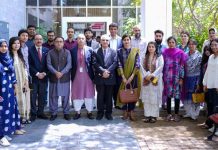The experts during the inaugural session of three-day long international
conference on ‘Sustainable Development: Halophytes for Green Revolution’
urged on the policies to adopt alternative solutions to tackle challenges
of food insecurity in future.
The Institute of Sustainable Halophyte Utilization (ISHU) of the University
of Karachi (KU), has organized second international conference at the
Karachi University Business School (KUBS), KU, is scheduled from January 07
to 09.
One of the keynote speakers, Professor Dr Hans-Werner Koyro from Germany
shared that people are getting older and requirement of getting good food
is also getting higher and higher as the competition with food has
increased over the years.
He informed that if one wants to work with salt resistance plants, then he
or she must keep it in mind that it is not easy at all. There are around
2000 different types of halophytes around the world and still the
definition of halophyte is not clear. Some people even labeled potatoes,
which is largely used as regular food item, as halophyte. Hence, there is a
dire need of research based use of plants for saline agriculture. We
believe, many local halophytes of saline habitats which are already
salinity tolerant, can be shaped as future crops through intense
direction-based research.”
Professor Dr Hans-Werner added that many plants are already being used as
food around the world and besides getting nutrition from such plants, there
are many other benefits including biofuels which is not bad for environment.
He observed that halophytes could also provide protection to the coastal
lines and in some cases, Pakistan and other countries, are using plants as
greenification as well. He advised that structurized work approach should
be adopted while working on halophyte projects.
Meanwhile, the Director UNESCO France Dr Miguel Clusener-Godt, shared that
it was his second visit to the country and Karachi University as well and
was pleased to see how academia and scientific bodies are moving forward in
the field of halophyte biology.
He observed that the higher education institutes are taking interest in
halophytes and spreading awareness and knowledge regarding the uses and
benefits of halophytes. The youngsters are taking interest in the topic
which is a very positive and good sign as they have to take over in future
and this is right time for them to learn and implement.
He was of the view that halophyte utilization is one of the most reliable
answers for heavy investments in science and particularly in agriculture
field. The food shortages could be minimized by adopting halophyte as
nonconventional crops for already salt-hit lands. The conference theme is
also in-line with the UNESCO’s sustainable development goals and also with
the Man and Biosphere Program.
The Advisor Science, UNESCO Thailand, Dr Benno Boer, informed the audience
that the Vice Chancellor of the University of Karachi, Prof. Dr. Muhammad
Ajmal Khan is one of the global key-drivers of halophyte research, and it
was him and his colleagues, who made substantial contributions putting
Pakistan on the world map as a country with significant achievements in
this important scientific subject.
He mentioned that last time he was at Karachi University in April 2018, and
observed researchers at ISHU were seriously trying to use salt-water for
agriculture, food- and energy security. “We concluded that they are true
scientific visionaries, ahead of their time. They realised long ago that
fresh-water resources are so limited, they only constitute less than three
percent of all the global water of which only one third is available for
human consumption.”
Referring to latest edition of the series of Sabkha, he further said that
the idea to develop a global book series on Sabkha Ecosystems was born when
he asked his colleague Dr Hans-Jörg Barth, who studied salt-deserts in the
late 80s and early 90s together with him, to write a scientific article and
define the Arabic term ‘Sabkha’.
He added that the term was used by biologist, ecologists, geologist, and
nature conservationists in their scientific documentations for the
description of certain saline ecosystems, but with a different
understanding on what exactly it means. We consulted international
specialists, and we secured the support of UNESCO, Springer Nature, and the
University of Karachi.
“Prof. Khan, Prof. Gul, and Dr. Clüsener-Godt were all contributors to the
first volume that was published in 2002, and they made major contributions
to the entire series throughout the time between then and now. The input of
the University of Karachi became increasingly more significant with every
volume published.”
Dr Boer shared that the final volume has a remarkable new dimension: the
Editor-In-Chief, for the first time, is a woman, Prof. Bilquees Gul. We
have achieved something big, tangible, and something that finds a lot of
global visibility in the international halophyte community. This book
series is a benchmark publication.
The chief guest, provincial minister for agriculture and supply and prices,
Muhammad Ismail Rahoo, expressed that there is a threat wobbling over
Pakistan regarding shortage of freshwater in future. The holding of such
informative conferences which suggests suitable solutions are always
helpful for the governments.
He informed that being part of the administrative body of the institute it
is his responsibility to promote the important mission of halophyte to
serve as a source of possible usage. Sindh need such plans as it is
affected with the saline land.
The Vice Chancellor, KU, Professor Dr Muhammad Ajmal Khan, mentioned that
world’s population has exceeded seven billion people. However, our natural
resources such as land, water, food and air are limited in supply and
resources like fossil fuel, fresh-water and biodiversity are declining. The
climate change and increased resources consumption are expected to
accelerate this undesired situation in future as well.
He shared that the dry lands are facing more problems and with continuous
increase of the human population we have to find new avenues for the
production of food and clean energy, as well as reduce the pressure on
limited fresh-water resources for agriculture in arid regions.
“The human’s survival depends upon food security and as sources of
freshwater are not available in large quantity, proper use of saline
resources is the only closest replacement or alternative options available
at the moment.”
He said that in Thar, owing to lack of sufficient rain, drought remains for
many years affecting the local communities in many ways. As the pattern of
rainfall has changes and alternate freshwater sources are not available in
good numbers, not only animals but humans are also dying. Therefore we
believe cultivation of halophytes using salty water irrigation can be a
sustainable way to produce fodder for the livestock of poor Thari
communities.
“We have already developed a model halophyte fodder farm in Thar. The
provincial chief minister has also visited and shown interest in taking it
to the next level and hopefully big plantation would be seen in coming days.”
He assured that drought effects could be removed and locals would not have
to migrate to other places and animals would not be dying if the government
decides to take advantages from their research.
Earlier, the Director of the ISHU, KU, Dr Bilquees Gul, in her welcome
notes, informed that main objectives of the three-day international event
is to discuss in general the sustainable use of halophytes as green
revolution and to bring together world renowned professionals, academia,
government agencies, UN agencies, leading experts in the field of halophyte
biology from all around the world and private sector to develop a
collaborative program.
She said experts would also discuss the current state, ideas, experiences
and future directions about the sustainable utilization of halophytes for
the common benefit of humanity. The latest information on promising
sustainable technologies and role of halophytes to combat global challenges
with special insights into development of salt resistance fodder/ forage
crops, energy feedstocks and other industrial products will also be
discussed.
She also informed that besides keynote lectures, seminar sessions, a field
trip to Thar Coal Block II, will provide the latest information on emerging
technologies and breakthrough research on salinity tolerance and
sustainable utilization of halophytes as non-conventional crops for
arid/saline lands.
While quoting Food and Agriculture Organization of the United Nations Land
and Plant Nutrition Management Service, Dr Bilquees Gul stated that over
six percent of the world’s land is affected by either salinity or sodicity.
The term salt affected refers to soils that are saline or sodic, and these
cover over 400 million hectares, which is over six percent of the world
land area.
In addition, she said that of the current 230 million ha of irrigated land,
45 million ha is salt affected (19.5 percent), and of the 1500 million ha
under dry land agriculture, 32 million is salt affected to varying degrees
(2.1 percent)”, she said.
She explained that the continuous expansion of salt affected land is
highest in some of the most populated and economically challenged countries
including Pakistan posing a serious threat to sustainable agricultural
production. On a global scale, it is estimated that every minute 3 ha of
arable land becomes unproductive due to secondary-induced salinization.
“Another FAO report suggests that by the year 2050, the world population is
projected to stabilize at around 9.5 billion people. In order to feed this
population, global agriculture must double its food production and farm
productivity must increase by 1.8 percent each year – indeed a tall order.”
Dr Gul observed that with 7.65 billion people inhabiting our common planet,
and all of us in need of the basic necessities, such as access to food,
clean water, clean air, carbon-balance, education, medicinal care, shelter
and employment, we simply have to support all avenues that lead to improved
situations. Scientific research is an absolutely essential ingredient to
achieve the United Nations Sustainable Development Goals.
She expressed that the ISHU, KU, is one of the leading institutes of the
world for research on halophytes and saline agriculture. She shared that in
recognition of achievements of ISHU in very short period of time (since its
establishment in 2006), UNESCO established first ever ‘Chair
in Sustainable Halophyte Utilization’ at ISHU in 2009 under UNITWIN
Programme of UNESCO. Despite small size and scarce funding, ISHU is trying
its level best to play a pivotal role in sustainable utilization of
halophytes and saline lands.
At the end of the inaugural session, traditional Sindhi Ajrak were
presented to the chief guest and international scholars.























